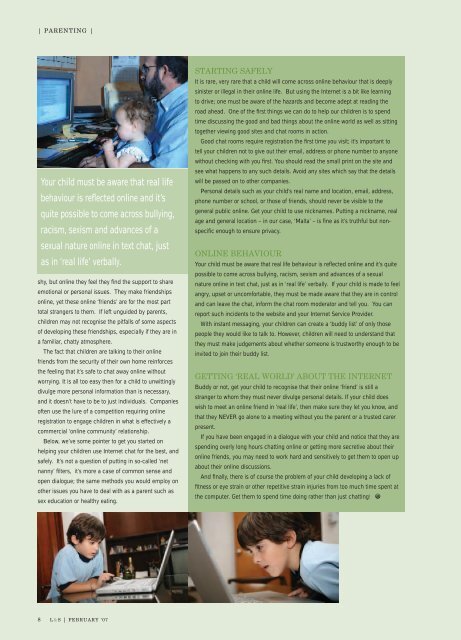Life&Style February Issue - MaltaRightNow.com
Life&Style February Issue - MaltaRightNow.com
Life&Style February Issue - MaltaRightNow.com
You also want an ePaper? Increase the reach of your titles
YUMPU automatically turns print PDFs into web optimized ePapers that Google loves.
| PARENTING |<br />
Your child must be aware that real life<br />
behaviour is reflected online and it’s<br />
quite possible to <strong>com</strong>e across bullying,<br />
racism, sexism and advances of a<br />
sexual nature online in text chat, just<br />
as in ‘real life’ verbally.<br />
shy, but online they feel they find the support to share<br />
emotional or personal issues. They make friendships<br />
online, yet these online ‘friends’ are for the most part<br />
total strangers to them. If left unguided by parents,<br />
children may not recognise the pitfalls of some aspects<br />
of developing these friendships, especially if they are in<br />
a familiar, chatty atmosphere.<br />
The fact that children are talking to their online<br />
friends from the security of their own home reinforces<br />
the feeling that it’s safe to chat away online without<br />
worrying. It is all too easy then for a child to unwittingly<br />
divulge more personal information than is necessary,<br />
and it doesn’t have to be to just individuals. Companies<br />
often use the lure of a <strong>com</strong>petition requiring online<br />
registration to engage children in what is effectively a<br />
<strong>com</strong>mercial ‘online <strong>com</strong>munity’ relationship.<br />
Below, we’ve some pointer to get you started on<br />
helping your children use Internet chat for the best, and<br />
safely. It’s not a question of putting in so-called ‘net<br />
nanny’ filters, it’s more a case of <strong>com</strong>mon sense and<br />
open dialogue; the same methods you would employ on<br />
other issues you have to deal with as a parent such as<br />
sex education or healthy eating.<br />
Starting safely<br />
It is rare, very rare that a child will <strong>com</strong>e across online behaviour that is deeply<br />
sinister or illegal in their online life. But using the Internet is a bit like learning<br />
to drive; one must be aware of the hazards and be<strong>com</strong>e adept at reading the<br />
road ahead. One of the first things we can do to help our children is to spend<br />
time discussing the good and bad things about the online world as well as sitting<br />
together viewing good sites and chat rooms in action.<br />
Good chat rooms require registration the first time you visit; it’s important to<br />
tell your children not to give out their email, address or phone number to anyone<br />
without checking with you first. You should read the small print on the site and<br />
see what happens to any such details. Avoid any sites which say that the details<br />
will be passed on to other <strong>com</strong>panies.<br />
Personal details such as your child’s real name and location, email, address,<br />
phone number or school, or those of friends, should never be visible to the<br />
general public online. Get your child to use nicknames. Putting a nickname, real<br />
age and general location – in our case, ‘Malta’ – is fine as it’s truthful but nonspecific<br />
enough to ensure privacy.<br />
Online behaviour<br />
Your child must be aware that real life behaviour is reflected online and it’s quite<br />
possible to <strong>com</strong>e across bullying, racism, sexism and advances of a sexual<br />
nature online in text chat, just as in ‘real life’ verbally. If your child is made to feel<br />
angry, upset or un<strong>com</strong>fortable, they must be made aware that they are in control<br />
and can leave the chat, inform the chat room moderator and tell you. You can<br />
report such incidents to the website and your Internet Service Provider.<br />
With instant messaging, your children can create a ‘buddy list’ of only those<br />
people they would like to talk to. However, children will need to understand that<br />
they must make judgements about whether someone is trustworthy enough to be<br />
invited to join their buddy list.<br />
Getting ‘real world’ about the Internet<br />
Buddy or not, get your child to recognise that their online ‘friend’ is still a<br />
stranger to whom they must never divulge personal details. If your child does<br />
wish to meet an online friend in ‘real life’, then make sure they let you know, and<br />
that they NEVER go alone to a meeting without you the parent or a trusted carer<br />
present.<br />
If you have been engaged in a dialogue with your child and notice that they are<br />
spending overly long hours chatting online or getting more secretive about their<br />
online friends, you may need to work hard and sensitively to get them to open up<br />
about their online discussions.<br />
And finally, there is of course the problem of your child developing a lack of<br />
fitness or eye strain or other repetitive strain injuries from too much time spent at<br />
the <strong>com</strong>puter. Get them to spend time doing rather than just chatting! .<br />
L&s | FEBRUARY ’07







![Sandro Chetcuti akku]at b'attentat ta' qtil - MaltaRightNow.com](https://img.yumpu.com/50098970/1/174x260/sandro-chetcuti-akkuat-battentat-ta-qtil-maltarightnowcom.jpg?quality=85)








![Malta tibqa' ]]omm mal-po]izzjoni li ddikjarat fis-summit](https://img.yumpu.com/44301444/1/174x260/malta-tibqa-omm-mal-poizzjoni-li-ddikjarat-fis-summit.jpg?quality=85)
